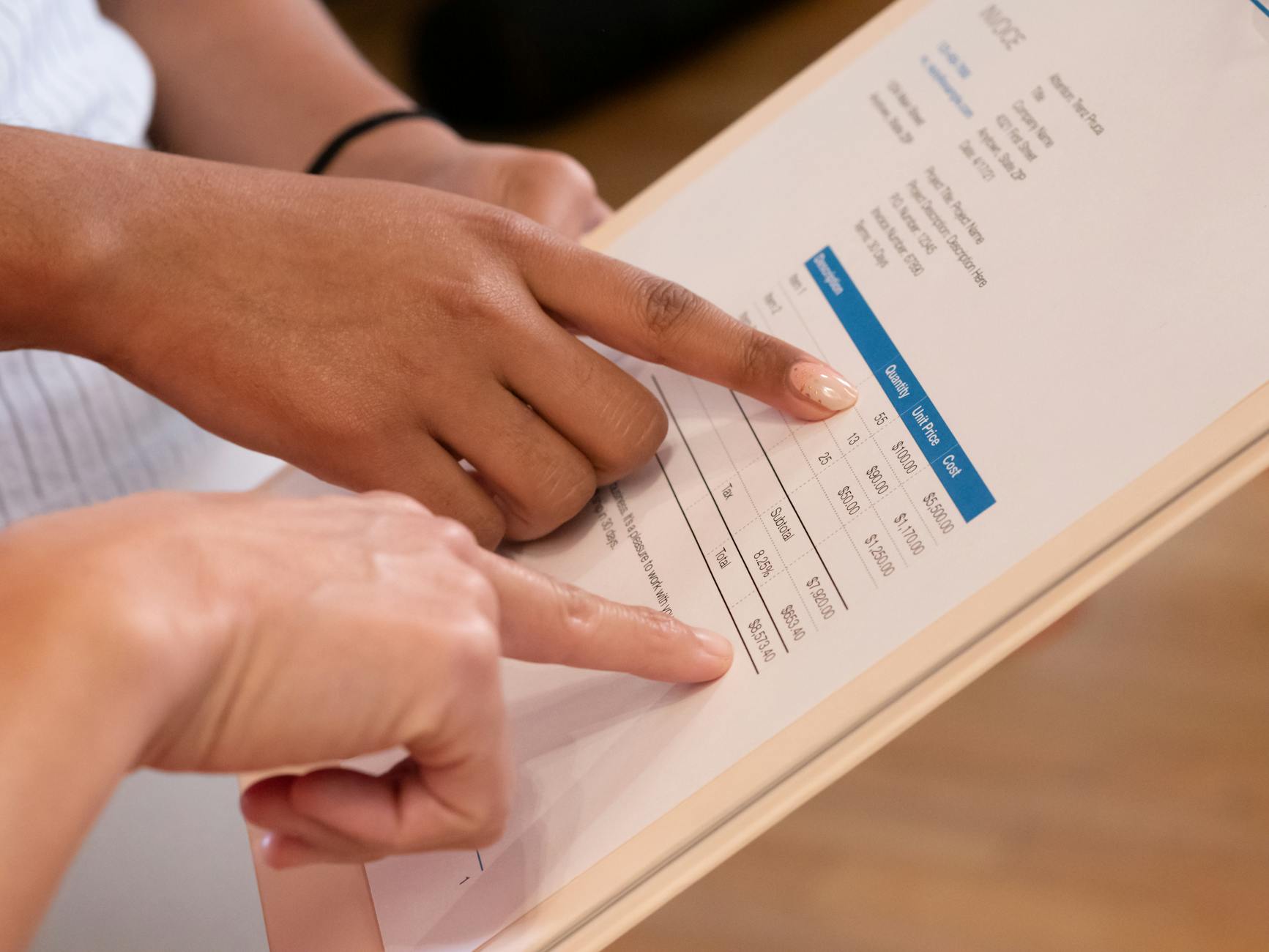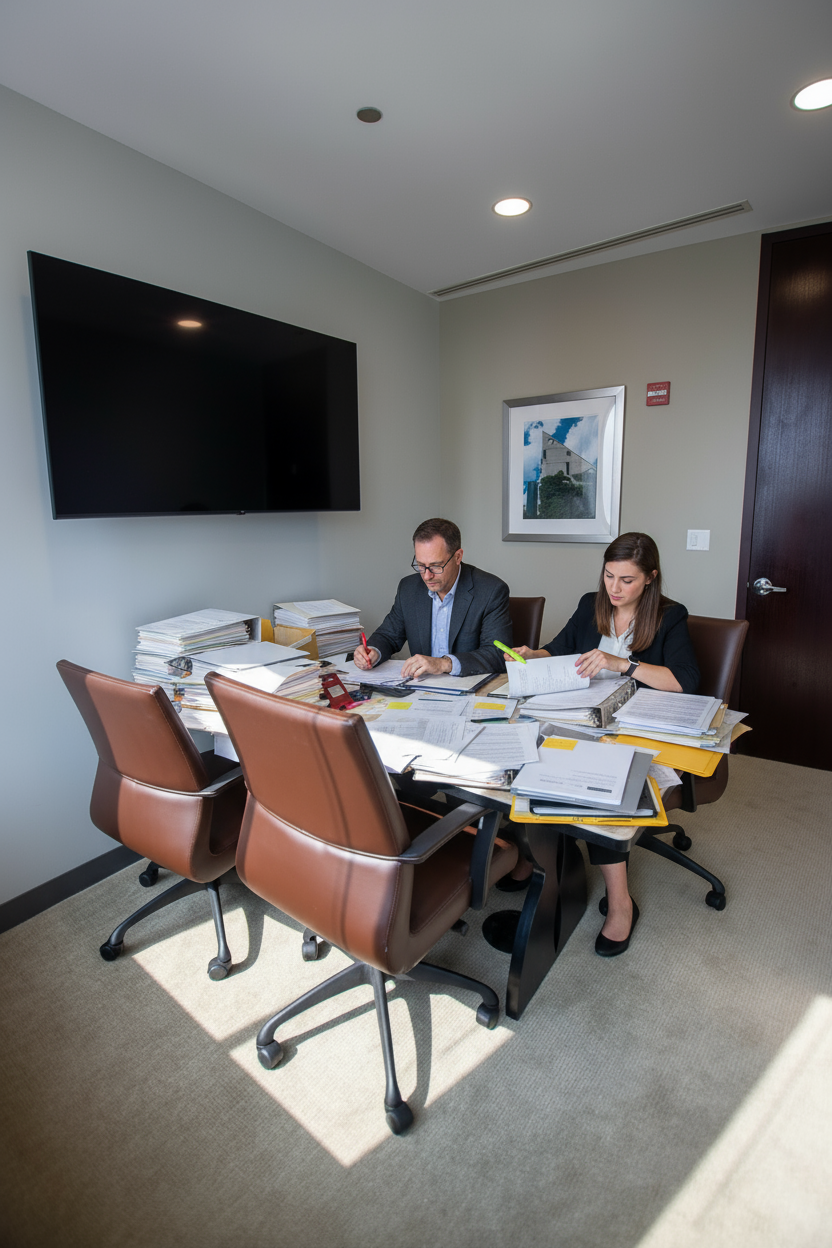Forensic Accounting: Protect Assets, Reveal the Truth
Financial misconduct can threaten even the healthiest organizations. Forensic accounting is the specialized practice of investigating financial records to find fraud, resolve disputes, and manage risk. Its purpose is to reveal the truth behind suspicious transactions and protect what matters most — your reputation and assets.
Organizations trust forensic accounting to address complex concerns plainly and efficiently. Turning Numbers helps companies track down hidden losses, uncover misstatements, and give clarity when the facts are blurred. With a proven record supporting organizations across many industries, our team delivers clear answers and confidence when you need it most.
If your business faces uncertainty or you want peace of mind about your finances, call us or fill out our contact form for a forensic consultation.
What is Forensic Accounting?
Forensic accounting is more than just reviewing numbers—it's where investigation meets expert financial analysis. This specialized practice uses accounting, auditing, and investigative skills to examine financial data for evidence of wrongdoing or financial misstatements. The goal is clear: to make sense of complex transactions and shine a light on hidden problems that can harm organizations.

Photo by Leeloo The First
Defining Forensic Accounting
Forensic accounting merges traditional accounting with investigative skills. It responds to suspicions of fraud, embezzlement, or other financial crimes. The work is detailed, requiring careful review of financial records to identify patterns, discrepancies, or behaviors that raise red flags.
These professionals aren't just accountants. They're detectives, analysts, and expert witnesses all in one. Their findings must be supported by evidence, ready for use in court, with documentation that stands up to strict scrutiny.
Key Purposes and Applications
Organizations use forensic accounting for several reasons, each helping to protect integrity and assets. Typical applications include:
- Fraud Detection and Prevention: Identifying signs of employee theft, misappropriation, or schemes designed to divert funds.
- Litigation Support: Supplying expert analysis and testimony in legal disputes where financial records are questioned.
- Risk Management: Reviewing processes and controls to minimize opportunities for future fraud.
- Regulatory Compliance: Assisting organizations in meeting standards set by industry regulators or government oversight.
Forensic accounting is also useful in unique situations such as fiduciary investigations , where trusted leaders might be involved in estate, trust, or board-related mismanagement.
The Forensic Accountant’s Toolkit
Forensic accountants rely on a diverse set of tools and techniques to uncover the truth. Their approach is practical and methodical, ensuring no detail is overlooked. Some common methods include:
- Data Analysis: Examining digital records, ledgers, and communications for inconsistencies or patterns of misconduct.
- Interviews and Interrogation: Speaking directly with stakeholders to clarify facts and uncover hidden motives.
- Tracing Transactions: Following funds across multiple accounts to find concealed assets or unauthorized transfers. Learn more about these methods in this article on Tracing Hidden Assets with Forensic Accountants.
- Document Review: Going line by line through invoices, contracts, and reports to pinpoint irregularities.
Forensic accountants combine these techniques with industry knowledge and skepticism, piecing together the story that the numbers are telling.
When Should You Consult a Forensic Accountant?
Not every financial concern needs a forensic accountant, but certain signs should prompt immediate action:
- Unexplained losses or expenses
- Inconsistent financial data between reports
- Whistleblower complaints around financial misconduct
- Pending business litigation involving financial claims
In these cases, a forensic accounting professional offers unbiased insight and clear solutions. Their findings can make or break a case, and their advice can protect an organization from further losses.
For a deeper look at how this field supports ethical business operations, explore the role of forensic accounting in corporate governance.
Forensic accounting gives organizations a powerful resource to spot threats and restore confidence. If you think your business could benefit from these services, call us or fill out our form for a forensic consultation.
Key Services in Forensic Accounting
Forensic accounting plays a crucial role for organizations dealing with uncertainty, suspicions of fraud, or complex business disputes. Each service is designed to uncover financial truths, restore trust, and provide clarity exactly when it’s needed. Below, we break down the main services you can expect from a trusted forensic accounting provider.

Photo by Kindel Media
Fraud Detection and Investigation
Fraud detection stands at the heart of most forensic accounting assignments. When organizations suspect internal theft, asset misappropriation, or manipulation of records, forensic accountants step in. Their process includes:
- Analyzing general ledgers for suspicious transactions
- Reviewing invoices and payment trails for inconsistencies
- Applying data analytics to large volumes of transactions
- Conducting interviews with employees to clarify gaps or discrepancies
The goal is clear: discover where funds went missing, identify those responsible, and map out exactly what happened. For a comprehensive look at how these experts trace hidden assets, check out the article on Tracing Hidden Assets with Forensic Accountants.
Litigation and Legal Dispute Support
Many forensic accountants serve as expert witnesses in court cases involving business partners, shareholders, or vendors. Their value here lies in providing independent, fact-based analysis to support or refute claims. Legal and litigation support may involve:
- Quantifying damages in breach of contract or partnership disputes
- Tracing and documenting financial misconduct in civil or criminal matters
- Preparing detailed reports that can stand up to scrutiny during depositions or cross-examinations
You can learn more about these services and their impact on the legal process by reading about legal and litigation services in forensic accounting.
Business Valuation and Economic Damages
Business valuation is needed during disputes around mergers, acquisitions, divorce proceedings, or shareholder disagreements. Forensic accounting approaches ensure that valuations are unbiased and backed by solid evidence. Common steps include:
- Conducting financial statement analysis to assess fair value
- Reviewing market benchmarks and comparable transactions
- Assessing the impact of wrongful conduct on business value
Interested in how these valuations are conducted? See the guide to forensic accounting valuation tools to understand the methods used by specialists.
Regulatory Compliance and Risk Assessments
Regulatory investigations and compliance reviews often call for forensic expertise. Whether a business needs to respond to a government inquiry or review internal compliance policies, a forensic accountant can:
- Test financial controls for weaknesses that allow fraud or errors
- Evaluate compliance with government and industry standards
- Prepare businesses to respond thoroughly during audits or investigations
Following proper compliance procedures not only protects assets but also helps avoid steep penalties or legal consequences down the road. For a more detailed take on compliance and investigative methods, learn more from this resource on forensic accounting and disputes.
Insurance Claims and Damage Calculations
Forensic accountants often get involved when organizations file insurance claims following property loss, business interruption, or employee dishonesty. Their role here is to:
- Quantify losses by reviewing financial statements and supporting documents
- Prepare clear, evidence-backed reports for insurers and claimants
- Offer expert support during settlement discussions or litigation
This service ensures fair recovery and reduces disputes with insurers.
Financial Statement Analysis and Forensic Audits
Inaccuracy or manipulation in financial statements can point to deeper issues. Regular forensic audits identify misstatements and help protect your reputation. This review may include:
- Reconstructing records where original documentation is missing
- Using specialized tools to spot unusual trends or outliers
- Providing actionable recommendations for remediation
Explore how these tools and analyses work with real-world examples in the post on techniques forensic accountants use in valuation.
The range of forensic accounting services adapts to each client’s situation but always centers on accuracy, transparency, and protecting business interests. If your organization needs support with any of these key services, call us or fill out our form for a forensic consultation.
The Value of Forensic Accounting for Organizations
Forensic accounting helps organizations respond to threats that can quietly shake a company’s foundation—fraud, hidden losses, and disputes that blur financial truth. Solid financial health isn’t just about strong numbers on a spreadsheet but ensuring every dollar is accounted for and every transaction stands up to scrutiny. Companies investing in forensic accounting protect not just their balance sheet but also their reputation and trust with clients, regulators, and employees.
 Photo by RDNE Stock project
Photo by RDNE Stock project
Strengthening Internal Controls
Strong controls are the defense line against costly mistakes or fraud. Forensic accounting does more than fix problems after they arise; it builds tighter processes and exposes gaps that would otherwise go unnoticed. Think of these controls as a company’s security alarm—quiet when things are right, but quick to flag issues before they spiral.
A well-crafted forensic review can help organizations:
- Spot weaknesses in their approval processes and cash controls
- Discover employees or partners sidestepping policies for personal gain
- Create clear pathways for whistleblowers to safely report concerns
By making financial operations more transparent, organizations lower risk and boost stakeholder trust. Learn more about real-world applications and how organizations have uncovered unseen risks in this resource on US Tariffs and Fraud Insights.
Safeguarding Against Fraud and Financial Crime
No business is immune to fraud. Employee theft, false invoicing, and financial statement manipulation can surface even in trusted workforces. Forensic accounting equips organizations with a shield and a spotlight—proactively detecting warning signs and providing guidance when issues appear.
These specialized accountants use advanced tools to:
- Analyze accounts for trends that don’t fit the business profile
- Trace complex transactions across different books or systems
- Reconstruct timelines leading up to losses or disputes
Many forensic accountants combine digital forensics to follow money trails in both physical ledgers and digital environments. Organizations get the support they need to not only investigate but also to correct processes and train staff for better prevention. For a deeper look into how this field continues to adapt, check out Future Trends in Forensic Accounting.
Providing Clarity in Legal and Regulatory Matters
Disputes and investigations can tie up company resources and damage public image. Forensic accountants step in to offer fact-based analysis that stands strong under legal, regulatory, or insurance scrutiny. Their work supports organizations as they work through:
- Shareholder, partnership, or vendor disputes
- Insurance claims for business interruption or fraud losses
- Regulatory audits requiring documented evidence of compliance
Their evidence is clear, traceable, and accepted in courtrooms and arbitration settings. By making complex financial issues easy to understand, these experts help speed up resolutions and reduce uncertainty.
Supporting Financial Recovery and Business Continuity
The impact of fraud or financial losses can linger long after discovery. Forensic accounting helps organizations recover more effectively by accurately quantifying losses, identifying avenues for recovery, and supporting claims with solid evidence. This helps businesses:
- Recover stolen assets with full backing for law enforcement or court action
- Negotiate better terms during insurance settlements
- Minimize downtime with actionable plans for improvement
When every dollar matters, having a trusted advisor to guide recovery is a game-changer. To explore in-depth guidance available, consider reviewing the Professional Forensic Accounting Services offered by experts who tailor solutions to each organization’s unique challenges.
Strengthening Decision-Making and Strategy
Forensic accounting gives leaders a reliable toolset for making smart, informed decisions, especially in high-stakes moments like mergers, acquisitions, or restructuring. With a clear financial picture, executives can:
- Identify risk exposures before large investments or changes in leadership
- Evaluate potential partners or vendors for hidden liabilities
- Back major strategy decisions with evidence-based analysis
In the hands of experienced professionals, forensic accounting shifts the power to the organization, letting decisions shape the future instead of reacting to hidden problems.
If protecting your people, finances, and reputation is a priority, forensic accounting brings both peace of mind and action-ready solutions. Call us or fill out our form for a forensic consultation.
When to Seek Forensic Accounting Services
Knowing when to involve forensic accounting can make all the difference for your organization. While routine bookkeeping and audits cover regular business operations, forensic accounting steps in when situations turn complex, risk-laden, or disputes threaten your bottom line. Catching the warning signs early helps you limit losses and build a stronger case for recovery.
 Photo by Nataliya Vaitkevich
Photo by Nataliya Vaitkevich
Red Flags That Signal the Need for Forensic Accounting
Certain warning signs suggest your organization should seek help from a forensic accountant, even if you’re not sure a problem exists. Here are the most common indicators:
- Unexplained Losses or Discrepancies: Mismatches between bank balances and statements or regular “rounding errors” that don’t add up may point to manipulation or theft.
- Sudden Drop in Profits: If your business sees a sharp decline in earnings without clear cause, there could be hidden losses siphoning funds or contracts.
- Internal Complaints or Whistleblower Reports: When employees raise concerns about suspicious transactions or favoritism, an outside expert can assess the evidence without bias.
- Missing Documentation: Key invoices, contracts, or receipts disappearing at critical times is a warning sign that someone may be hiding improper activity.
- Frequent Write-Offs or Bad Debts: If accounts receivable consistently go unpaid or debts are regularly written off, there may be underlying financial misstatements.
- Regulatory or Legal Investigation: If your company faces a government inquiry or lawsuit, forensic accounting expertise ensures your records withstand outside scrutiny.
You’ll find more detail about these warning signs in resources like 9 Signs a Business Owner Needs a Forensic Accountant , which explores what should trigger the call for professional help.
Situations Where Forensic Accountants Add Value
The need for forensic accounting goes beyond fraud or theft. Specialized expertise supports organizations in scenarios where ordinary audits and compliance reviews just aren’t enough. Some of the most common scenarios include:
- Business Disputes: Partner, shareholder, or vendor conflicts often center on financial disagreements. A forensic accountant can uncover facts and present them clearly for negotiation or in court.
- Alleged Employee Misconduct: Suspicions about embezzlement, kickbacks, or unauthorized spending require careful investigation and clear reporting.
- Divorce or Ownership Changes: Business valuations become contentious when owners or families split up. Impartial financial analysis can support equitable resolutions.
- Major Transactions: Mergers, acquisitions, or dissolutions require clean books. Forensic accountants can flag any irregularities before, during, or after a deal.
- Insurance and Liability Claims: When a loss event occurs, objective, evidence-backed financial reviews speed up insurance claims or dispute resolutions.
Learn more about how timely action affects outcomes in the article When to Hire a Forensic Accountant: Red Flags, Risk Scenarios & Why Timing Matters.
Who Should Consider Forensic Accounting Services?
While any organization—large or small—can be at risk, certain types of companies face greater exposure. You should consider forensic accounting if you:
- Manage high volumes of transactions or cash flow.
- Rely heavily on trust with partners, suppliers, or contractors.
- Operate in regulated industries like healthcare, nonprofit, or government work.
- Have gone through recent leadership changes or restructuring.
- Face recurring disputes or sudden lawsuits.
- Want to protect assets during times of uncertainty.
Taking a proactive stance, rather than waiting for problems to surface, can save you significant resources and repair time. For more context about who benefits most, see this overview on when to hire a forensic accountant.
How Timing Affects Outcomes
Engaging a forensic accountant early secures faster results, preserves evidence, and minimizes risk. Acting after fraud or issues escalate may limit recovery options and drive up costs. Timely intervention can:
- Prevent further financial losses.
- Preserve critical documents and digital records.
- Improve your standing in litigation or with insurers.
- Restore stakeholder and customer confidence quickly.
For advice tailored to your situation, explore more about professional forensic accounting services or contact our team.
If your organization faces any of these situations or warning signs, contacting a forensic accountant is a smart step to protect your assets and future. Call us or fill out our form for a confidential forensic consultation.
Conclusion
Forensic accounting stands as a safeguard for organizations working to protect their assets and maintain trust in every transaction. By bringing clarity and accountability to complex financial situations, forensic accountants help businesses recover from losses, resolve disputes, and move forward with confidence.
Turning Numbers has the experience and focus organizations need during uncertain times. If you want reliable support, reach out to our team. Call us or fill out our form for a confidential forensic consultation. For more depth on how forensic accounting adapts to today’s challenges, explore the evolution of forensic accounting in modern times.
Partner with Turning Numbers for expert insight and peace of mind as you protect your organization’s future. Thank you for reading.




